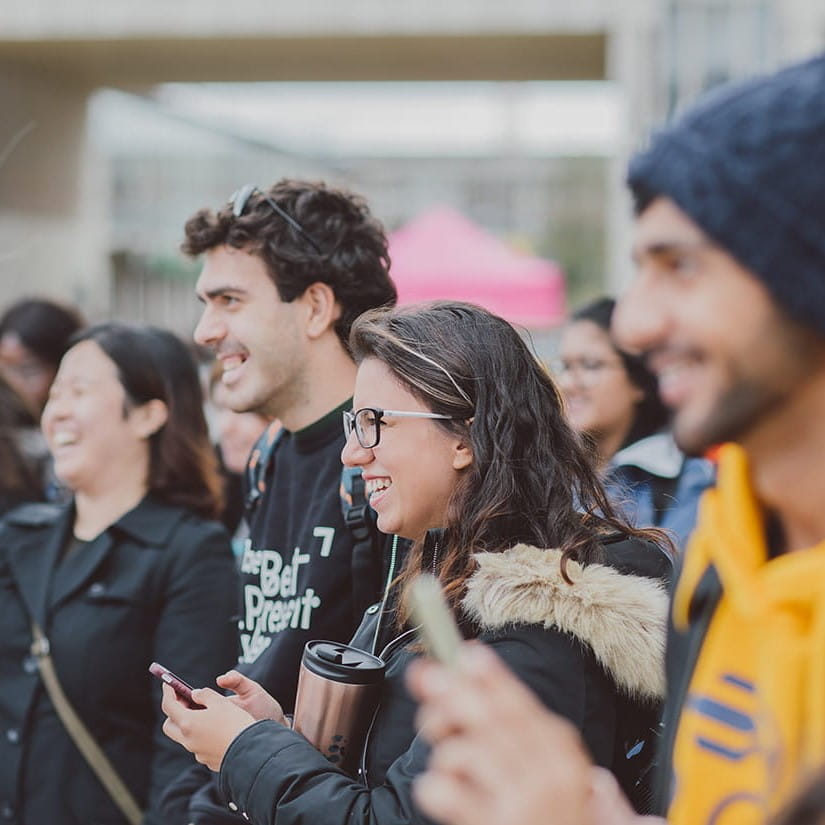Researching with community based organisations
In 2022 the Community Action Clinic launched a new module to enable students to work in partnership with local community-based organisations. The module, available at both undergraduate and postgraduate levels, offers students the opportunity to complete a research brief from the organisation for their dissertation project. This process supports the organisation by bringing in academic research to their practices, while enriching the students with the experience of working in partnership to address issues of social justice.
One of the students taking part in the 2022/23 postgraduate programme, Justyna Sadowy, responded to a research brief from Community 360, looking at the ways in which funding gets distributed among local charities and third-sector organisations. The project involved a short-term placement, with Justyna spending time working in the Community 360 hub, gaining first-hand experience of the important work that this organisation does to support local community groups.
On completing the dissertation, Justyna reflects about the experiences working on the project.
When I first heard about the opportunity to complete my dissertation through a short-term placement, I was immediately intrigued. The idea of stepping out of the academic bubble and getting involved in a real-world project seemed like the perfect way to bridge the gap between theory and practice. So, I jumped at the chance to work with a local charity, joining their funding allocation team for a few months. The experience was not only eye-opening but also taught me valuable lessons about how organizations make tough decisions with limited resources.
Joining the funding allocation team meant diving into the complex world of resource distribution. I quickly learned that while the organization’s mission was to support as many community projects as possible, the reality was that funds were limited, and not every worthy cause could be supported. Our job was to review applications from various local groups and decide how to distribute the funding in a way that would have the most impact. This was more than just an administrative task; it was about making choices that could change lives. This experience gave me a deeper understanding of the limitations organizations face and the difficult decisions they must make to maximize impact.
For my dissertation, I have been researching the funding allocation process. To get a well-rounded view, I conducted interviews with stakeholders and through these conversations, I aimed to uncover insights into the challenges and limitations of the current approach, as well as gather suggestions on how to make the process more efficient, transparent, and equitable for all involved.
During my research I realised that the decision-making process was much more involved than I initially thought. It wasn’t just about choosing the projects that seemed the most important but also considering factors like the feasibility of the project, the organization’s capacity to deliver results, and how the funding could benefit the wider community.
Unlike academic exercises where problems have clear solutions, working with the funding allocation team meant dealing with the messiness of real life. Some projects had unexpected challenges that came up during the allocation process, requiring quick thinking and flexibility. There were also times when I had to gather more information from stakeholders or consult with other team members to gat a better understanding of particular topic.
One thing that stood out to me during the placement was the importance of listening to the community members directly affected by the company’s decisions. The company made an effort to meet with project representatives and get a better understanding of their needs and goals. This approach wasn’t just about making informed decisions; it was also about ensuring that the allocation process was fair and transparent.
It became clear to me that being part of a funding allocation team wasn’t just about crunching numbers—it was about connecting with the community. Hearing the stories and struggles of the people behind these projects reminded me that every decision we made had real-world consequences.
Working in funding allocation as part of my dissertation placement was an incredibly valuable experience that went far beyond academic learning. I got to see how the theories and models I had studied could be applied in practice and how they often needed to be adapted to fit real-world complexities. It also taught me the importance of being adaptable, open-minded, and ready to engage with the community to truly understand the impact of our work.
I realized that a dissertation doesn’t have to be just a requirement for graduation; it can be an opportunity to make a real difference. This experience gave me a sense of purpose and a new perspective on how research can directly benefit society.
This short-term placement turned out to be so much more than just another step towards completing my degree. It was an opportunity to take the skills and knowledge I’d developed during my studies and apply them to help solve real problems in the community.
If there’s one takeaway from my experience, it’s that practical, work-based learning adds a whole new dimension to the traditional academic journey. It’s not just about acquiring knowledge—it’s about learning how to use that knowledge to bring about change and, at the same time, not feeling the boredom and repetitiveness of ordinary dissertation. And for me, that’s what made this short-term placement an important part of my education.

.jpeg)